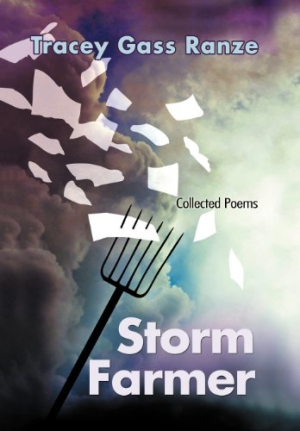Storm Farmer
Collected Poems
In her debut poetry collection, Storm Farmer, Tracey Gass Ranze reflects upon the details of her world with passion and an underlying sense of joy. Whether she’s writing about the connection she feels to the Delaware River, which flows near her mountain home, or the awe of seeing Halley’s Commet with her own eyes, her words are infused with a perceptible optimism that’s not at all overblown. In addressing themes of family, connectedness to place, and love, her poems indicate the poet is a person who lives her life with a glass-half-full philosophy.
In the poem “room empty, the leaving,” Gass Ranze reflects, as she does throughout the collection, on her four sons: “the babies start off pliable / then sharpen to teens / who prick or prod.” This is a spot-on observation of the wonder and yearning parents often feel as they watch their children grow from innocent, dependent creatures to young adults balking at parental concerns that don’t necessarily keep up with a teenager’s transitioning desire for autonomy. It’s an example of the kinds of images the poet crafts that demonstrates an outlook of playfulness coupled with longing. On a larger scale, it exemplifies her subtle interpretation of the human condition.
Part of the human condition is mourning. In writing about the loss she feels after her mother’s death in “Butterfly Wings,” Gass Ranze expresses the idea that feelings of pain are sacred and should not be dismissed: “I spend my days finding the tools in the shed, that voice / in my head, to harvest my understanding of the other side / where her kiss slid through hard barriers of the heart.” In fact, bereavement is an opportunity that reaps much—perceptiveness, love, and even new poems, as noted in her next poem, “the heavy.” Here, the poet remarks that the hole the loss of a loved one causes will be filled with tears and sadness, but also with prospects—with art and creativity and wisdom.
Only in her poems in the middle section of the book does the reader get a sense of Gass Ranze’s darker side. She embraces a kind of rage when it comes to matters of politics, including the 2000 U.S. presidential election, 9/11, and the Wall Street meltdown. These poems are less personal and more political. They still connect, naturally, to the poet’s observations of her everyday life—from American flags in the poem “Window Panes” to taking part in a peace march in “Fighting for Peace is like Raping for Love.” By taking the action of writing poetry, she finds solace.
Gass Ranze is part of the Upper Delaware Writers Collective and the Milanville Poets, UnLtd., and some of her poems have appeared in anthologies. She writes in a variety of fixed forms like pantoums, villanelles, and sonnets as well as in free verse. Taken as a whole, Gass Ranze’s collection is thoughtful and intelligent—a welcome addition to any poetry library.
Reviewed by
Olivia Boler
Disclosure: This article is not an endorsement, but a review. The publisher of this book provided free copies of the book and paid a small fee to have their book reviewed by a professional reviewer. Foreword Reviews and Clarion Reviews make no guarantee that the publisher will receive a positive review. Foreword Magazine, Inc. is disclosing this in accordance with the Federal Trade Commission’s 16 CFR, Part 255.

